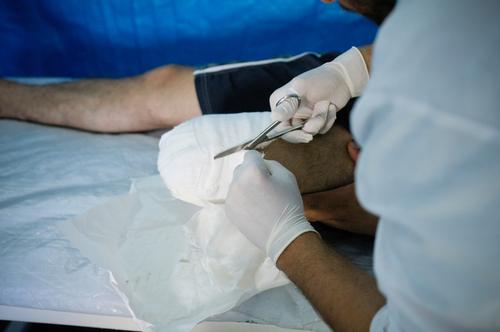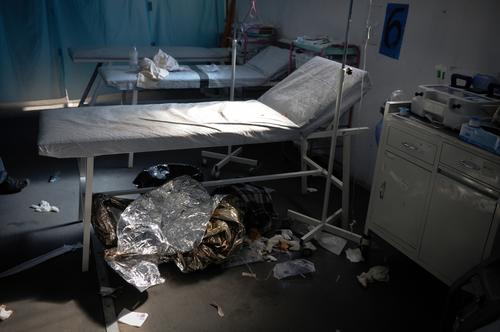As violence continues unabated, Dr. N, an MSF-supported hospital director in a besieged area of the East Ghouta suburbs near Damascus, describes the medical response to the horrific bombing of a crowded square on 23 January.
Around 200 to 250 people were gathered in the public square when it was bombed by a fighter jet. Ambulances were immediately directed to the area to evacuate the wounded. The first batch of wounded arrived few minutes later: 20 bodies and 15 wounded. The triage started right away and priority was given to people with life-threatening wounds. Those who required urgent surgery were transferred to the operating theatre, while pleural tap, haemorrhage control and bone stabilization were carried out in the triage zone, on the few beds available or on the ground. Paramedics were running and bringing in more wounded people, so I realized there was a catastrophe going on. It was not the “routine” shelling we have become used to.
While ambulances were striving to evacuate the dead and wounded, the area was hit again, causing more injuries, including among paramedics. Thankfully, their wounds were not serious. But an ambulance was hit and totally destroyed and a second one was damaged. We could hear the explosions and the sound of the fighter-jets. I couldn’t stop thinking about the possibility of a raid against the hospital, as this had happened previously, when we lost two of our colleagues.
Our medical team had mixed feelings of fear and sorrow, particularly after they started recognizing family members and friends among the dead and wounded. The arrival of people looking for relatives created a state of shock and panic in the hospital. We carried on our work, trying to save as many lives as we could.
Our hospital, like the majority of hospitals in the region, lacks basic equipment and medical consumables, and we have limited capacity for this sort of emergency, both in terms of space and beds. However, we are the closest medical facility to the raid zone. We have a single treatment room with basic equipment for monitoring vital organs. This single machine only works when there isn’t an electric supply failure, but power supply is rare. We have no specialised respiratory equipment, so a trained medical staff member helped patients breath through pressing regularly on a resuscitation breathing mask. We were running low on most sterilization and anesthesia products and surgeries were performed in an unconventional way due to the lack of proper anesthesia products. We were using offcuts of as bandages, sterilized but not absorbent. I think our biggest problem was the lack of blood bags and perfusions, both essential for saving lives.
The final toll was very heavy. We received 128 victims. We managed to save the lives of 60 people. But 68 of our patients lost their lives.Among the wounded, there were men, women and children. Their wounds ranged from minor to very major. The most depressing were the nerve injuries. When the brain is hit by shrapnel, there is not much we can do. There are no brain surgeons in the whole area and the means to perform a brain surgery are simply not available. Among the most painful cases for us are the children, when we have to amputate a limb to save their life. Such difficult decisions are a real test for doctors with very limited options.
In that single day, we used most of our medical stock, attempting to respond to the emergency. We used almost 80% of our surgical and medical consumable stock, as well as using up most of our stock of venous catheters. We are currently struggling to make up for the shortage. It is almost a mission impossible in view of the blockades and road blocks. If we are lucky we will get there, but the process will take a long time and tremendous effort. The same goes for donations. We are hardly able to receive any donations because of the siege. Some hospitals in the region have shared with us some of their limited stock, but there is not really enough to go around. We can hardly imagine how we could cope should a similar emergency occur again.
The world has been watching for years. The medical situation, and the general living conditions, are beyond any red lines and alarm bells have been vainly ringing for a long time.
During the last four months, MSF teams outside of Syria have been in contact, on a daily or weekly basis, with medical staff from this and other hospitals supported by the organization in besieged East Ghouta, as the bombing has intensified, and with it the needs the medical staff is striving to respond to.
Through its emergency medical support program, covering 100 hospitals and medical points in Syria, mainly in the besieged areas, MSF is providing these facilities with supplies to maintain a stable healthcare offer to victims. However, repeated raids cause mass injuries and lead to supply shortages that are hard to make up for despite all attempts.





